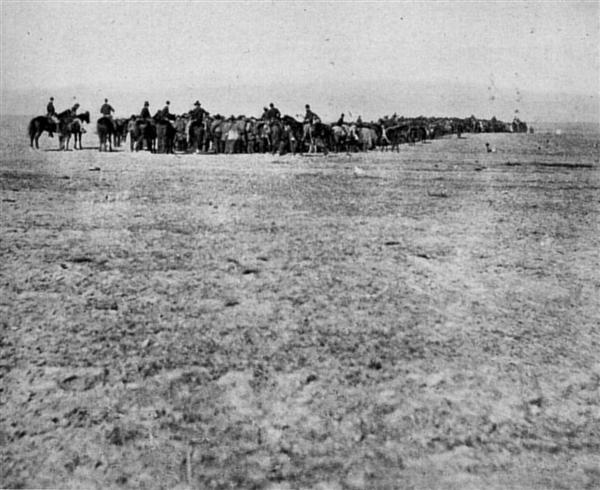|

On the Way to Freedom — Exchanged Confederate Prisoners Bound For Cox's
Landing under Guard, September 20, 1864
At a slight distance, this might seem a picture of a caravan
in the Sahara Desert, but as a matter of fact the men in the far-stretching
line are Confederate prisoners escorted by cavalry on their way from the
Federal lines to Cox's Landing. The moral courage to surrender is held by
all true soldiers to be greater than the physical courage that it requires
to die. Sometimes the words are spoken for the soldier by one in authority
whose sense of responsibility for the lives of those he leads causes him to
sink personal pride. Before the surrendered soldier there rise two hopes,
parole or exchange, and one dreaded alternative - long imprisonment. Parole
embraces the assumption that the man with the courage to fight for his
country is a man of honor who will keep his word. A signature to a bit of
paper, and the soldier may walk forth a free man to return to his home and
family, bound to abstain from any further warfare until "regularly
exchanged." Grant took the words of twenty-nine thousand men at Vicksburg
and let them go. As the war progressed there grew to be a regular barter and
exchange in human flesh and military utility - a pawn for a pawn, a knight
for a knight, a king for a king, sick men for sick men, and well men for
well. Still the prisons of both North and South were filled with the
unfortunate. There were specified places, such as Cox's Landing and City
Point, where these transfers took place. Grant's later policy was to allow
as few as possible. A glance at this hardy band of captured Confederate
veterans here tells the reason why. There are a hundred fights in these men
yet. Why let them return to the firing-line to combat Union soldiers anew?
The only reason was to release Union prisoners from confinement and hasten
their return to duty. |
